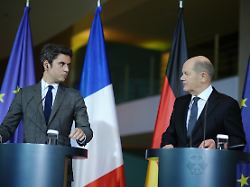Scholz disagrees with Attal
Paris is moving ahead with the Mercosur agreement
February 5, 2024, 10:03 p.m
Listen to article
This audio version was artificially generated. More info | Send feedback
Before his inaugural visit to Chancellor Scholz, French Prime Minister Attal invokes German-French friendship. But things get crunchy at the meeting in Berlin. The controversial topic is not just aid to Ukraine. Scholz also doesn’t get through to Attal when it comes to concluding the Mercosur trade agreement.
Germany and France continue to disagree over the free trade agreement negotiated by the EU with the Latin American Mercosur states. While Chancellor Olaf Scholz reiterated his desire to put the agreement into force soon, French Prime Minister Gabriel Attal once again described it as immature. This agreement has a “geostrategic significance,” emphasized Scholz after his meeting with Attal in Berlin.
One cannot “complain on the one hand that Europe’s influence is decreasing (…) and on the other hand not find ways to improve our continent’s growth prospects through good economic relations,” emphasized the Chancellor. The negotiations with the Mercosur countries have been going on for 20 years, so it would be desirable for them to be concluded soon, he added.
The French Prime Minister, on the other hand, reiterated his country’s rejection “because the conditions are not right.” It should not be the case that Europe bans certain production methods but then imports products that are manufactured in this way. “This is called unfair competition,” said Attal. “It can happen that we don’t agree, and we’re entitled to that,” he said to Scholz.
Scholz wants to stand up to Putin
Attal defended himself against the Chancellor’s recent indirect criticism of the unevenly distributed burden of aid to Ukraine in Europe. “Our commitment will expand, but it’s not just about the amount of funding, but also about the quality of the military equipment,” said Attal. France is sending “material of the latest generation” to Ukraine, he emphasized.
For his part, Scholz reiterated that he would continue to advocate “that the USA and all member states in Europe make such a large contribution that the Russian President’s calculations do not add up.” Kremlin leader Vladimir Putin wants to wait it out. “He hopes that at some point we’ll just stop going,” said Scholz. However, this will not happen.
Shortly before his inaugural visit to Scholz, Attal called for increased cultural exchange between France and Germany and for learning the respective partner languages. “We have to continue to cultivate that,” he said to representatives of French people living in Germany. “Perhaps my generation has sometimes forgotten the price and weight of the Franco-German friendship,” said the 34-year-old.
Attal warns against populism
“The strength of Europe is measured by the strength of the German-French friendship,” he emphasized. The populists were just waiting for the two countries to disagree. “They lie in wait to exploit the slightest differences between us, to serve baser instincts and harm Europe,” he said. He consciously chose Germany as the destination for his first trip abroad. “I will always refuse to accept any weakening of the German-French friendship,” he emphasized.
Attal passed his first vote of confidence in the Paris National Assembly that morning. The left-wing populist party La France Insoumise (LFI) justified the move by saying it wanted to “protect” the population from higher electricity and medicine prices as well as reductions in unemployment benefits. Attal’s predecessor Elisabeth Borne survived more than 30 motions of no confidence during her one and a half year in office.
At 34, Attal is the youngest politician to hold this post and the first to openly admit his homosexuality. His ex-partner Stéphane Séjourné is foreign minister. President Emmanuel Macron wanted to open a new chapter with the government reshuffle after the controversial immigration law.
